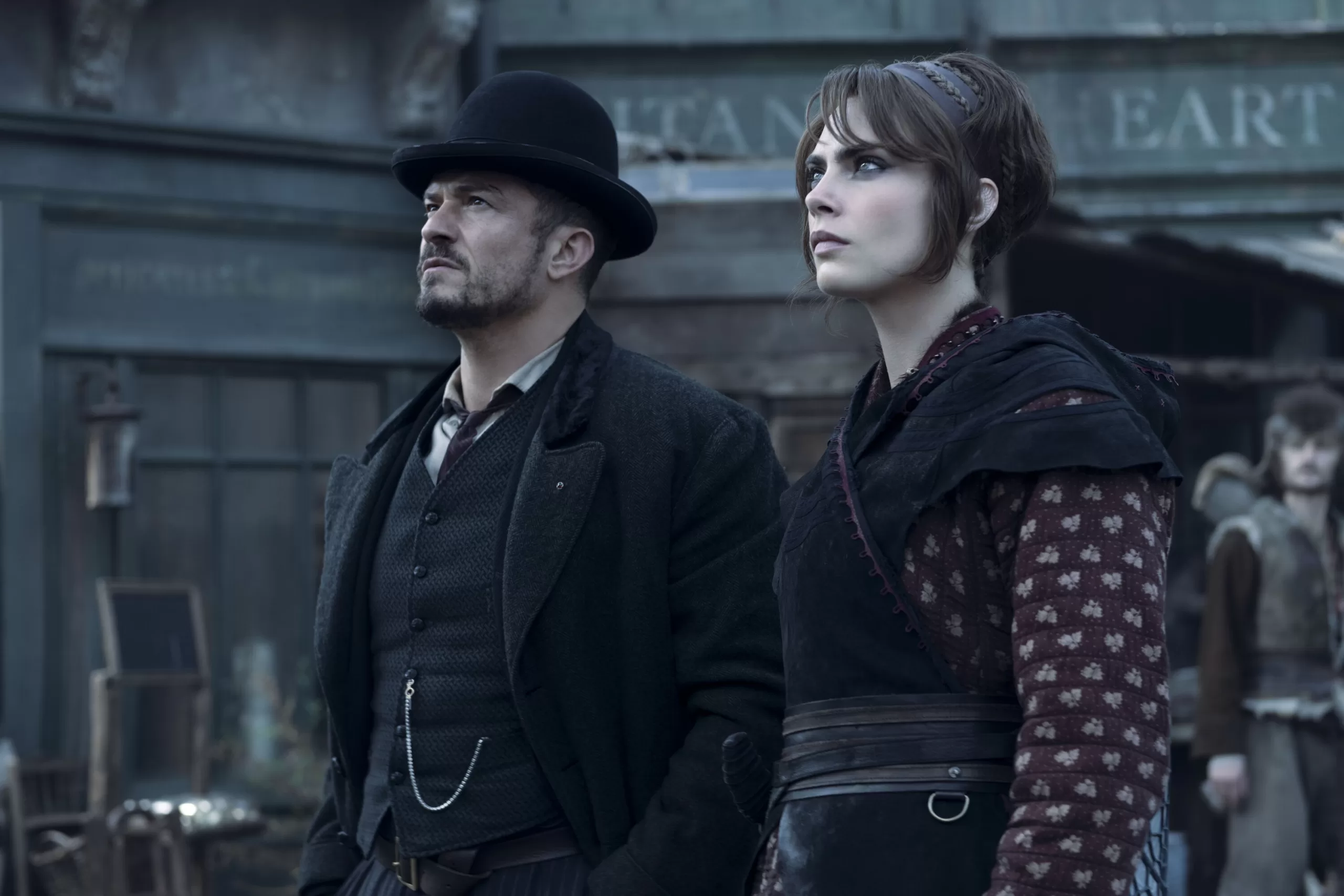It’s been some time for fans of Carnival Row. After four years of waiting, the series returns to a two-episode-a-week schedule, kicking off with a dual-header that flies to new heights in shock value.
For those who don’t remember, Carnival Row was, at its best, a show of mixed but powerful messages. Series creator Travis Beacham’s original idea focused on a story of xenophobia and refugees, set in a world where the Fae of fairy tales were displaced after losing their territories due to human wars. The show begins as an investigation of a fairy-killing Jack the Ripper-type, where inspector Rycroft “Philo” Philostrate (Orlando Bloom), took audiences through an investigative journey into the crime-riddled slums of Carnival Row.
Highlights of the first season were Philo’s forbidden love story with Vignette (Cara Delivigne), an incestuous affair-riddled power struggle over the dynasty of the Chancellor, and a Beauty and the Beast retelling between social misanthrope yet wealthy Faun, Agreus (David Gyasi) and his high-society neighbor and heiress, Imogen (Tamzin Merchant).
Critics were not so kind with a 57% approval rating despite the 88% user score on Rotten Tomatoes. Still, I feel the second season’s first two episodes does a better job by going beyond the melodrama of manic pixie rogue girl meets detective Legolas, and focusing on what’s happened to Carnival Row’s denizens after the events of the season one finale.
Last we left off, the Fae were segregated from the rest of the city, just as Jonah Breakspear (Arty Froushan) was anointed the new Chancellor after the death of his father. Accomplished with help from his lover/leader of the opposition party, his stepsister, Sophie (Caroline Ford), we learned at last season’s climax, how Sophie was the mastermind of every event in season one due to her powerful ambition to form an incestuous monarchy. All, unbeknownst to her brother.
I’ll admit when finally putting Carnival Row’s main story together as a whole it’s… pretty ridiculous. This is likely why it was announced that season two will be the final season as most critics found that the series was lacking in direction and message.
This is why I’m surprised to admit this as someone who didn’t care for, but then gave a chance to the show and its newest season only recently: the series is actually quite good. And the first two episodes of season two… are really good.
Carnival Row S2 E1: Fight or Flight Review

Season two begins with a whole lot of action. Whereas the original pulled in audiences with suspense and mystery, this new season goes into it knowing full-well we’re familiar with these characters, and instead, embraces a rather fast-paced fight club and a heist sequence happening simultaneously. Pretty much kicking off season two with a bang.
If that weren’t enough, we see Philo do his best re-enactment of his Legolas days by battling a troll; whereas Vignette goes on to embrace her role as a rebel leader by heisting some medicine with her people, proving to herself and the Row, her value. This season, the show seems to be embracing the aptitude of its ensemble better, all to get a rounded perspective.
Now, it must be stressed, the season is a lot more gruesome this time around. If it’s been a while since you’ve seen the show, be prepared for the amount of shock unleashed in this episode as it’s difficult to watch at moments. Season two takes a look into the deteriorating state of affairs for the Fae. We get a gross glimpse at disease and poverty, and how bad the Fae, racistly called Critch by the police, keep getting abused. As a result, public executions as a show of force by the government are conducted to maintain order, with the Chancellor, struggling to maintain power in the Row.
On a personal note, I think the themes of the show hit harder now than they originally did in 2019. Given what’s happened with George Floyd, the war in Ukraine, and the fall of Afghanistan, so much has changed in a short timespan where I think the show benefits in exploring these themes now compared to when it first aired.
I stress this, because it’s obvious the Chancellor is not a terrible person, but rather, that Jonah is just a stupid person. Someone who’s so obviously in over his head. Skillfully played by Arty Froushan, there’s an ignorance to the character that’s subtle, yet defining, in that it makes the audience hate the character, but also, absolutely relate to him as a man who’s just trying to be someone after having his entire life/fate dictated to him his whole life.
Though behind every idiot puppet in leadership, is always the real power-player pulling the strings. Sophie Longerbane is this real power, though in this case, the leader of the opposition seems to be in a conundrum as re-elections may be underway soon and she might not have her party’s full support.
Now, Sophie and Jonah’s usurping of power is a confusing point in the series? As chancellors and leaders can seemingly be inherited roles passed down to their children like in monarchies, but are somehow, still privy to… elections? It’s a confusing point but one that forces the real power players to prove themselves. Likely, in a grandiose gesture to come. Audiences should remember too: that Philo himself is also the Chancellor’s step-son. How this all plays into the show will be unraveled in the season-long journey.
As for the rest of the episode, sex work gets minimized now as the Row is less of a working lower-class refuge for Fae, and more of a detention camp for those the government deems impure. There are, however, a few topless scenes of Orlando Bloom and his chesticles if that’s what folks are looking for.
In lieu of gratuitous sex is an abundance of murder, though not as gratuitous, as the depictions of the living-conditions of the Fae. This time around, we get quite a lot of scenes of the different types and casts of Fae-folk. Most importantly, Aoife the witch, who hasn’t fully departed from the series it seems – lingering magic left behind and all that. There’s also a new type of mysterious Fae-murders to solve.
Finally, Agreus and Imogen remain the most compelling of the show’s storylines. Not only because it breaks walls regarding interracial relations, but also because unlike the series’ other bleak themes, theirs is about love and kindness. Which is all the reason fans will be shocked to see what happens to them as their tale escalates in danger almost immediately.
Finally, I must stress, I never really liked Cara Delevigne as an actress, but I absolutely love her portrayal in this show. And the first episode only increases that love even further, as she’s really come into the role in a dalliance of curt toughness, while maintaining manic pixie cuteness.
Carnival Row S2 E2 Review: New Dawn
I’m not going to get into too many details for this episode because of its many embargo rules but suffice to say: shocking is the right word for it. This is the episode that’s easily the make-or-break moment for those looking to jump back into the series and I’d get to finishing this episode before making up your mind of whether or not to continue.
Without spoilers, I will say that episode two is grim. There are more than a few death scenes in this one and a lot of characters do not make it out alive. It’s all a very tense episode that tests the roles and responsibilities of Philo, Vignette, and Agreus. Taking the characters, but also, the Carnival Row extended cast, to new heights.
For instance, Tourmaline herself, played by Karla Patsy Crome, seems to be developing her own unique story arc. It’s wonderful given that she’s mostly played as a supporting role for Vignette thus far in the series, though scary once you realize for mysterious forces she’s messing with.
We also see the return of an old puppeteer and educator come back into the fray with lots of skullduggery involved, all for a storyline that’s as equally redemptive as it is ominous, because doing the right thing never seems to work out for those in Carnival Row.
This episode picks up right after the cliffhanger of episode one where things go from seemingly promising to utterly terrible, and many of Agreus’ plans go awry.
The ruins of places of refuge is a theme that permeates a lot of moments in this episode and actions get taken out of necessity for survival, leading to revelations and hasty decisions that go terribly awry across the board.
Put simply, the conflict between government and the impoverished Fae comes to a head regarding their rights to survive in this episode. All leading to a deathly consequences. Whereas the first episode set up an evident divide separating aristocracy from the sins of war, this episode, absolutely tears that away leaving many casualties in the process.
The Take
I’d give the series a watch as it gets really good. The cast hits their marks and the message seems more focused than ever before.
4/5 Stars

